Yeztugo (lenacapavir) provided near-total protection against infection in clinical trials
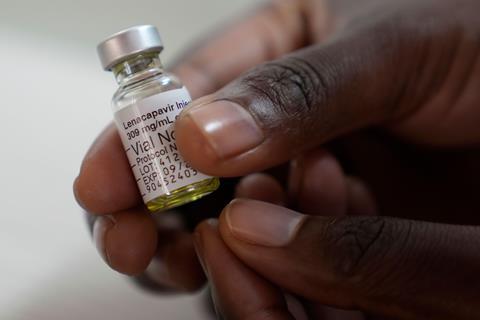
An injection that can prevent HIV infection for six months has been approved by the US Food and Drug Administration (FDA). Gilead’s Yeztugo (lenacapavir) becomes the longest acting form of pre-exposure prophylaxis (PrEP) against the risk of sexually acquired HIV in adults.
It works by interfering with HIV’s ability to form its outer protein shell (capsid) and hits the virus at multiple points in its replication – viral DNA entry into host cells, virus assembly and capsid formation. ‘It leads to no particular cross-resistance with any other antiretroviral drugs, so in that sense, it is very good,’ says Dennis Liotta at Emory University in Atlanta, US, whose team is working to develop its own antiviral and PrEP drugs.
Yeztugo is viewed as superior to other PrEP medications because patient compliance with six-monthly injections is significantly easier than other drugs that need to be taken much more frequently. Two phase 3 trials in sub-Saharan Africa showed that 99.9% or more of people taking Yeztugo remained HIV negative. Both trials reported that Yeztugo performed better than Gilead’s older daily oral PrEP, Truvada (emtricitabine and tenofovir disoproxil).1,2 It’s long duration and high levels of protection contributed to the journal Science naming lenacapavir as its 2024 breakthrough of the year.
Lenacapavir was already approved by the FDA in 2022 as an antiretroviral medicine (marketed as Sunleca) for adults living with HIV-1 whose infections could not be controlled with existing treatments due to resistance, intolerance or safety considerations. Daniel O’Day, Gilead’s chief executive, described Yeztugo in a statement as offering ‘a very real opportunity to help end the HIV epidemic’. Advances in HIV treatments in recent decades have drastically improved the lives of patients with HIV–Aids, but long term infection prevention is still a challenge. While work continues on potential vaccines, they remain a long way from clinical success.
While Liotta acknowledges Yeztugo will be ‘an important advance for a subset of people in developed regions like the US, Europe and parts of Asia,’ he warns it is ‘not a panacea’, and not comparable to a vaccine. ‘They are being narrow in their approval and there are some serious side effects such as joint pain after the injections in some people. There are also about 100 listed drug–drug interactions for lenacapavir,’ he adds, which could be a problem for people who take a lot of other medicines. ‘This will work best for younger, healthier patients who aren’t on a lot of other therapies,’ says Liotta.
Liotta also expects the drug to have very little impact in low- and middle-income countries since – at least initially – it will be more expensive than other PrEP combinations, some of which are now available as generics. Gilead has invested so much in PrEP medicines that ‘I don’t think we are going to see any competitors enter the marketplace very quickly,’ says Liotta, meaning prices are unlikely to fall substantially before Gilead’s patents expire. He adds that companies are also now very adept at extending their patent exclusivity using secondary patents.
The market for PrEP is significant. Yeztugo is expected to achieve US sales of over $100 million (£73 million) in 2025, growing to $1.5 billion or more by 2028. GSK’s Apretude (cabotegravir) – injected every two months – sold £279 million in 2024, almost doubling its 2023 sales. Meanwhile, Gilead’s best-selling daily PrEP tablet, Descovy (emtricitabine and tenofovir alafenamide), sold over $2.1 billion in 2024.
References
1. L-G Bekker et al, N. Engl. J. Med., 2024, 391, 1179 (DOI: 10.1056/NEJMoa2407001)
2. C F Kelley et al, N. Engl. J. Med., 2024, 392, 1261 (DOI: 10.1056/NEJMoa2411858)





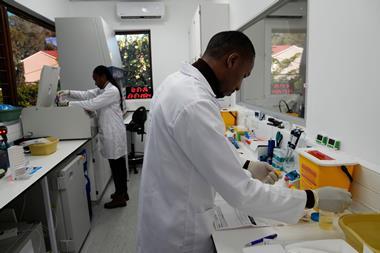
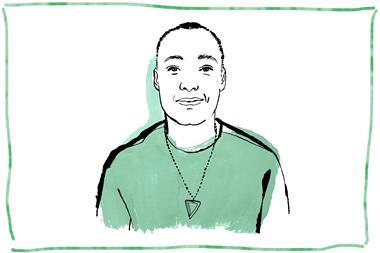
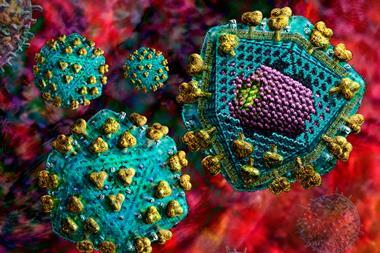
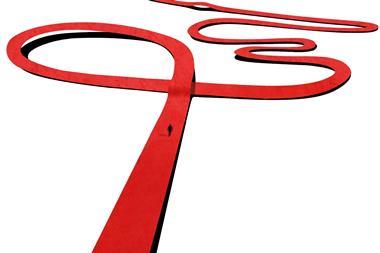








No comments yet